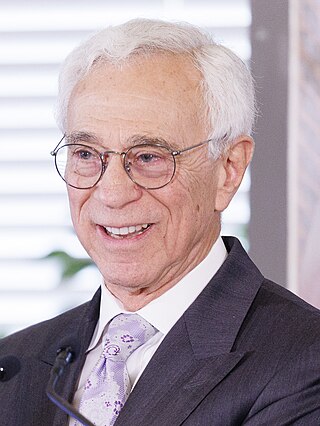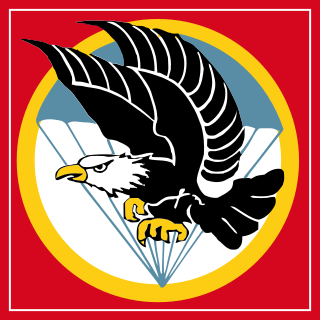Related Research Articles

William Childs Westmoreland was a United States Army general, most notably the commander of United States forces during the Vietnam War from 1964 to 1968. He served as Chief of Staff of the United States Army from 1968 to 1972.

Maxwell Davenport Taylor was a senior United States Army officer and diplomat of the mid-20th century. He served with distinction in World War II, most notably as commander of the 101st Airborne Division, nicknamed "The Screaming Eagles."

John Paul Vann was a lieutenant colonel in the United States Army, later retired, who became well known for his role in the Vietnam War. Although separated from the military before the Vietnam War reached its peak, he returned to service as a civilian under the auspices of the United States Agency for International Development and by the waning days of the war was the first American civilian to command troops in regular combat there. He received the Presidential Medal of Freedom and was the only civilian in Vietnam to receive the Distinguished Service Cross. He died on June 9, 1972, in a helicopter crash in Vietnam just after the Battle of Kontum.

Samuel Vaughan Wilson, also known as General Sam, was a United States Army lieutenant general who completed his active military career in the fall of 1977, having divided his service almost equally between special operations and intelligence assignments.

Jack Howard Jacobs is a retired colonel in the United States Army and a Medal of Honor recipient for his actions during the Vietnam War. He serves as a military analyst for NBC News and MSNBC and previously worked as an investment manager.

B.G. Burkett is a retired Army officer and financial advisor. He is best known as co-author of the self-published book Stolen Valor (1998), written with journalist Glenna Whitley. It received the Colby Award for military writers in 2000.
John L. Plaster is a former United States Army Special Forces officer regarded as one of the leading sniper experts in the world. A decorated Vietnam War veteran who served in the covert Studies and Observations Group (SOG), Plaster co-founded a renowned sniper school that trains military and law enforcement personnel in highly specialized sniper tactics. He is the author of The Ultimate Sniper: An Advanced Training Manual for Military and Police Snipers, The History of Sniping and Sharpshooting, and Secret Commandos: Behind Enemy Lines with the Elite Warriors of SOG, a memoir of his 3 years of service with SOG.
The lead-up to the Battle of Kontum began in mid-1971, when North Vietnam decided that its victory in Operation Lam Son 719 indicated that the time had come for large-scale conventional offensives that could end the war quickly. The resulting offensive, planned for the spring of 1972, would be known as the Easter Offensive in the South and the Nguyen Hue Offensive in the North, Nguyen Hue being a hero of Vietnamese resistance against the Chinese in 1789. The Easter Offensive would make use of fourteen divisions and would be the largest in the war.

William Michael Steele is a retired United States Army lieutenant general who commanded major organizations including U.S. Army, Pacific, the Combined Arms Center and the 82d Airborne Division. A native of Atlanta, Georgia, he graduated from The Citadel in 1967 and earned a Master of Arts in management from Webster University in St. Louis. His military education includes the National War College.
The William E. Colby Military Writers' Award was established in 1999 by the William E. Colby Military Writers' Symposium at Norwich University in Vermont in order to recognize "a first work of fiction or non-fiction that has made a major contribution to the understanding of intelligence operations, military history, or international affairs." It is named in honor of William Egan Colby. As of 2021, Alex Kershaw is the chair of its selection committee.

George Samuel Blanchard was a United States Army four-star general who served as Commander in Chief, United States Army Europe/Commander, Central Army Group from 1975 to 1979.

The Vietnamese Rangers (Vietnamese: Biệt Động Quân), commonly known as the ARVN Rangers or Vietnamese Ranger Corp (VNRC), were the light infantry of the Army of the Republic of Vietnam. Trained and assisted by American Special Forces and Ranger advisers, the Vietnamese Rangers infiltrated beyond enemy lines in search and destroy missions. Initially trained as a counter-insurgency light infantry force by removing the fourth company each of the existing infantry battalions, they later expanded into a swing force capable of conventional as well as counter-insurgency operations, and were relied on to retake captured regions. Later during Vietnamization the Civilian Irregular Defense Group program was transferred from MACV and integrated as Border Battalions responsible for manning remote outposts in the Central Highlands.

Harry William Osborne Kinnard II was a senior United States Army officer who, during the Vietnam War, pioneered the airmobile concept of sending troops into battle using helicopters. Kinnard retired from the military as a lieutenant general.

The Vietnamese Airborne Division or VNAD was one of the earliest components of the Republic of Vietnam Military Forces. The Vietnamese Airborne Division began as companies organized in 1948, prior to any agreement over armed forces in Vietnam. After the partition of Vietnam, it became a part of the Army of the Republic of Vietnam. This division had its distinct origins in French-trained paratrooper battalions, with predecessor battalions participating in major battles including Dien Bien Phu and retained distinct uniforms and regalia. With the formation of an independent republic, the colonial paratroopers were dissolved, however regalia and aesthetics alongside the nickname "Bawouans" would be retained.
Lý Tòng Bá was a major general of the South Vietnamese Army of the Republic of Vietnam.
Firebase 6 is a former U.S. Army and Army of the Republic of Vietnam (ARVN) base southwest of Đắk Tô in the Central Highlands of Vietnam.

Polei Kleng Camp is a former U.S. Army and Army of the Republic of Vietnam (ARVN) base west of Kontum in the Central Highlands of Vietnam.
Firebase Delta is a former Army of the Republic of Vietnam (ARVN) firebase northwest of Kontum in the Central Highlands of Vietnam.
Operation MacArthur was a United States Army military operation in the Central Highlands of South Vietnam from 12 October 1967 to 31 January 1969. The early phases of the operation encompassed the Battle of Dak To from 3 to 23 November 1967.

Major General John Gillespie Hill, Jr. was a United States Army officer who served in the Korean War and the Vietnam War.
References
- ↑ Gardner, Jan (March 30, 2013). "'Kontum: The Battle to Save South Vietnam' wins Colby Award". Boston Globe. Archived from the original on May 2, 2014. Retrieved May 24, 2015. Alt URL
- 1 2 3 Pollak, Sally (March 8, 2013). "Stowe Vietnam vet wins award for military history book". Burlington Free Press. Retrieved May 26, 2015.
- 1 2 "Footprints: Retired Lt. Col. Thomas P. McKenna". Fayetteville Observer. January 1, 2012. Retrieved May 24, 2015.
- ↑ "Thomas McKenna". Norwich University. Retrieved May 24, 2015.
- ↑ Reviews of Kontum: The Battle to Save South Vietnam include:
- Leo, Thomas W. (Spring 2012). "Reviewed Work: Kontum: The Battle to Save South Vietnam Thomas P. McKenna". On Point. 17 (4): 58. JSTOR 26363057.
- Veith, George J. (Winter 2013). "Reviewed Work: Kontum: The Battle to Save South Vietnam Thomas P. McKenna". Journal of Cold War Studies. 15 (1): 147–149. JSTOR 6924309.
- Wettemann Jr., Robert P. (Summer–Fall 2012). "Reviewed Work: Kontum: The Battle to Save South Vietnam Thomas P. McKenna". The Oral History Review. 39 (2): 387–389. JSTOR 41811759.